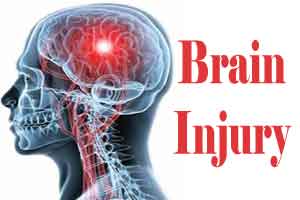- Home
- Editorial
- News
- Practice Guidelines
- Anesthesiology Guidelines
- Cancer Guidelines
- Cardiac Sciences Guidelines
- Critical Care Guidelines
- Dentistry Guidelines
- Dermatology Guidelines
- Diabetes and Endo Guidelines
- Diagnostics Guidelines
- ENT Guidelines
- Featured Practice Guidelines
- Gastroenterology Guidelines
- Geriatrics Guidelines
- Medicine Guidelines
- Nephrology Guidelines
- Neurosciences Guidelines
- Obs and Gynae Guidelines
- Ophthalmology Guidelines
- Orthopaedics Guidelines
- Paediatrics Guidelines
- Psychiatry Guidelines
- Pulmonology Guidelines
- Radiology Guidelines
- Surgery Guidelines
- Urology Guidelines
Amantadine : A new treatment option for emotional problems after traumatic brain injury

A drug originally developed in the 1960s as an antiviral medication is showing promise as a treatment option for people who suffer from increased feelings of aggression following traumatic brain injury, Indiana University School of Medicine researchers have reported.
Aggression and anger are among the most common emotional and behavioral symptoms experienced by traumatic brain injury patients often resulting in poorer rehabilitation outcomes and negatively affecting patients' relationships with family and friends and their ability to live at home and maintain steady employment.
The team of researchers, led by Flora Hammond, MD, chair of the IU School of Medicine Department of Physical Medicine and Rehabilitation and Covalt Professor of Physical Medicine & Rehabilitation, found that in multiple studies of patients with chronic traumatic brain injury and moderate-severe aggression, taking 100 miligrams of the drug Amantadine twice daily appeared to be beneficial in decreasing aggression, from the perspective of the patients.
Their findings were published in the newest issue of the Journal of Head Trauma Rehabilitation, for which IU School of Medicine associate professor Dawn M. Neumann, PhD, served as topical issue editor focusing on treatment for emotional issues after traumatic brain injury.
"Of the vast array of consequences of traumatic brain injury, emotional deficits are among the most prevalent, persistent, and challenging to treat," Dr. Neumann wrote in her issue preface. "However, they remain grossly understudied compared to other impairments, especially with respect to interventions. As emotional functioning is integral to well-being and quality of life, it is our obligation as rehabilitation researchers and clinicians to endeavor to narrow this gap."
Dr. Hammond said scientists initially realized the potential for Amantadine to help patients with brain injuries because people with Parkinson's disease, a disorder of the central nervous system, showed cognitive improvements while taking the drug to prevent viruses such as the flu. Amantadine is no longer widely used as an antiviral medication, but it is still used to help people with Parkinson's disease, and -- now -- those who experience aggression due to traumatic brain injury, she said.
One of Dr. Hammond's patients is also one of her colleagues, Elena Gillespie, PhD, an adjunct assistant research professor at IU School of Medicine who suffered from a mild brain injury after a bicycle accident.
Dr. Gillespie said at first, she didn't recognize her own symptoms. She was feeling irritable and exhausted all of the time and another colleague suggested she might have a brain injury. Dr. Gillespie made an appointment to see Dr. Hammond as a patient, which is how she discovered she had a concussion and mild brain injury. After trying other drugs, Dr. Gillespie was prescribed Amantadine.
"The effects were immediate and just amazing," Dr. Gillespie said. "It calms down part of your brain and gives you a moment to pause and reflect."
Dr. Gillespie, who works with brain injury patients as part of her role at IU, said she has seen it work in other patients as well.
"It helps you reclaim your identity a bit," she said. "And to get that back helps you get your quality of life back too."
Dr. Hammond said traumatic brain injuries are very common, as they can happen suddenly to people of all ages and demographics. It's estimated that someone in the United States suffers from a traumatic brain injury once every 15 minutes, she said.
This study is important, she said, because it expands treatment options for brain injury patients with aggression, which can have devastating effects on people's lives and ability to function.
For more details click on the link : Flora M. Hammond, James F. Malec, Ross D. Zafonte, Mark Sherer, Jennifer Bogner, Sureyya Dikmen, Marybeth P. Whitney, Kathleen R. Bell, Susan M. Perkins, Elizabeth A. Moser. Potential Impact of Amantadine on Aggression in Chronic Traumatic Brain Injury. Journal of Head Trauma Rehabilitation, 2017; 32 (5): 308 DOI: 10.1097/HTR.0000000000000342

Disclaimer: This site is primarily intended for healthcare professionals. Any content/information on this website does not replace the advice of medical and/or health professionals and should not be construed as medical/diagnostic advice/endorsement or prescription. Use of this site is subject to our terms of use, privacy policy, advertisement policy. © 2020 Minerva Medical Treatment Pvt Ltd